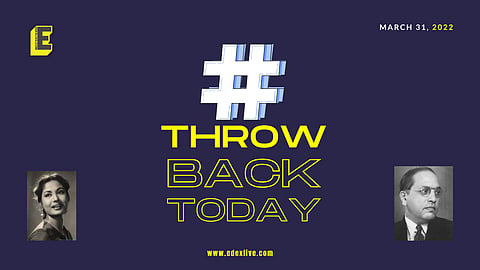

On this day, March 31, 1990, Dalit leader and the Chairman of the Drafting Committee of the Indian Constitution, Dr Babasaheb Bhimrao Ramji Ambedkar, was conferred the nation's highest civilian award Bharat Ratna, posthumously. Dr Ambedkar will always remain one of the most influential figures in the Indian democracy. Born on April 14, 1891, his life was full of challenges at every point. He went on to be a jurist, economist, politician and social reformer. One of his prominent pieces of writing includes an undelivered speech written in 1936 — Annihilation of Caste.
Dr Ambedkar had famously vowed to not die as a Hindu. In 1956, he converted to Buddhism. Later that year, he completed the final manuscript of his book on Buddhism, The Buddha and His Dhamma, in December 1956. Three days later, on December 6, he passed away in his sleep at his home in Delhi.
Tragedy, thy name is Meena Kumari
On March 31, 1972, the tragedy queen of Hindi cinema passed away. Meena Kumari was only 39 when she died, but she achieved great success during the short life that she lived. In the years prior to her death, Kumari had delivered spectacular performances in movies like Sahib Bibi Aur Ghulam, Baiju Bawra and Sharada. But, she is most well known for the film that was released just a few weeks before her death — Pakeezah. As the news of her demise was announced, the audience flocked to the theatres to catch the last glimpse of the finest actor of all time.
The actor was grappling with alcoholism and it was liver cirrhosis that killed her. Meena Kumari was dedicated to her craft, she was a singer as well as a poet. Javed Akhtar once said, “People like Meena Kumari are paradoxes. We try to understand them, we appreciate them, we criticise them, we pity them, we laugh at them, we admire them. But they remain paradoxes.”
